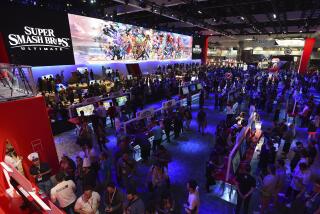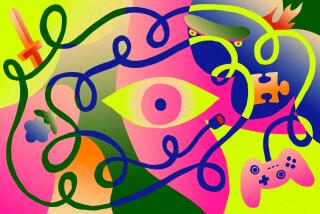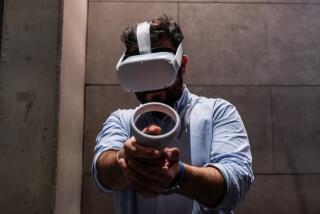Nintendo touts new Wii U console at E3 but CEO avoids spotlight
To help launch its upcoming Wii U console and recapture the company’s market momentum, Nintendo Co. called upon its most powerful friends — Donkey Kong, Luigi and Zelda.
The Japanese game giant placed its iconic characters at center stage during its E3 video game convention news conference Tuesday, promoting “New Super Mario Bros. U,” “Nintendo Land” and “Pikmin 3.”
Nintendo highlighted the Wii U platform, which will hit stores this year during the holiday season and will let gamers play simultaneously on a television and a second iPad-like controller with its own screen. Wii U will also feature an online social network called Miiverse, which enables players to team up for games and communicate using cartoonish avatars called Miis.
Missing from the Tuesday lineup, however, was Satoru Iwata, the company’s chief executive.
As the 123-year-old Japanese company heads into a new era in video games, one that’s made far more competitive by the emergence of Apple Inc., Facebook Inc. and Google Inc. as powerful new players, all eyes are on Iwata and his plan for reviving Nintendo’s flagging fortunes.
Demand for its once-popular Wii console has fallen off sharply since its 2006 debut. Annual sales of the device peaked in 2009 at nearly 26 million units worldwide but dropped to 9.8 million last year.
Iwata’s strategy for reviving Nintendo’s glory depends on the Wii U, a new console that will feature a touch-screen tablet controller that doubles as a virtual scratch pad, webcam and TV remote.
Whether Nintendo succeeds depends on how well Iwata can execute the company’s Wii U launch.
Despite being the public face of Nintendo, few know much about him, even within Nintendo. His official bio has just five sentences.
“I don’t think he’s fully understood because the company is not fully understood,” said P.J. McNealy, a consultant at Digital World Research in Boston. “To understand Iwata is to understand Nintendo. The two are one and the same.”
On a crisp March day in San Francisco last year, two men took to the stage before their respective audiences. One was Steve Jobs, presenting the iPad 2 to a rapt crowd in the Yerba Buena Center for the Arts. The other, nearby at the Moscone Center, was Iwata, who addressed thousands of riveted game developers.
The two sat at the helm of very similar companies. Like Jobs’ Apple, Iwata’s Nintendo had inspired a fanatical fervor among its customers.
“There’s a mystery and intrigue about Nintendo that’s very similar to how people feel about Apple,” said Geoff Keighley, executive producer of MTV Network’s GameTrailers TV. “Like Apple, you never know what Nintendo is going to do next.”
But the two executives could not have been more different. Jobs was the charismatic public face. Iwata, on the other hand, has shied away from publicity during his decade-long tenure as Nintendo’s CEO.
“He’s not a self-promoter,” said Howard Lincoln, former chairman of Nintendo’s U.S. business and a current board member. Despite knowing Iwata for close to two decades, Lincoln says he knows little about Iwata’s family life or hobbies.
“Some people talk before they think,” said Perrin Kaplan, president of Zebra Partners, a game consulting firm. “He thinks before he talks. His demeanor is adorable. But make no mistake, he is seriously focused and determined.”
Though Iwata joined Nintendo in 2000 as head of the company’s corporate planning, his entire career has been linked to the Kyoto, Japan, company.
His first job upon graduating from the Tokyo Institute of Technology was software programmer at HAL Laboratory Inc., a company that made games for Nintendo. Among the HAL titles Iwata worked on was “Kirby’s Dream Land.” The hero was an eraser-pink fluff ball that had to save his world from a voracious villain. The series remains a staple in the Nintendo franchise.
Iwata, whose round face bears a resemblance to the character Kirby, has adhered to a strict Nintendo policy against personal promotion and is rarely forthcoming about his personal views, some of which the executive shared in a recent email exchange.
“To provide the consumers with meaningful surprises, we actually have to defy their expectations, but in a good way,” he told The Times through a translator. “At the same time we need to respond to consumer expectation, but also move beyond them.”
Iwata shares Nintendo’s insistence on meticulously polished games. Much like Apple under Jobs, Nintendo under Iwata obsesses over every minor detail and insists on making its hardware suit the needs of its software.
“I am an engineer by education and a game developer by training,” Iwata said. “My default consideration is not how well a product will sell, or how it compares to other games on the market, but rather the reaction from the gamers who are playing it. How much will they enjoy this? How can we make it better?”
One result of this thinking was the DS, which launched in 2004 as a radical redesign of the Game Boy line. Another was the Wii.
The Wii soon found its way into a host of places that had never seen a console, including nursing homes, cruise ships and libraries — something that delights Iwata.
“In my heart, I’m still a gamer,” Iwata said.






